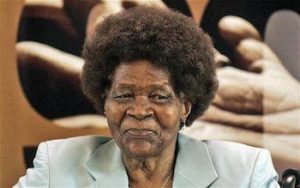
Albertina Sisulu
*Albertina Sisulu was born on this date in 1918. She was a Black South African activist and nurse.
Born Nontsikelelo Albertina Thethiwe to Bonilizwe and Monica Thethiwe, she was born in the Tsomo district of Transkei, South Africa. She was the second of five children, and although her mother survived the Spanish Flu, she was constantly ill and very weak. As the eldest girl, it fell upon her to take on a motherly role for her younger siblings. She stayed out of school for long periods, which resulted in her being two years older than the rest of her class in her last year of primary school. Even from a young age, she showed strong maternal instincts.
These leadership instincts underlined the respect she earned during the struggle when she was called the ‘Mother of the Nation.’ When she entered a competition to win a four-year high school scholarship, her age counted against her as she was disqualified from the prize even though she had come in first place. Angered by the unfair treatment (the competition rules had set no age limit on the prize), her teachers wrote to the local Xhosa language newspaper, Imvo Zabantsundu, making a strong case for Thethiwe to be given the prize. The article caught the attention of the local Roman Catholic Mission priests, who then communicated with Father Bernard Huss at Mariazell. Father Huss arranged for a four-year high school scholarship for her at Mariazell College.
1936 she left for Mariazell College in Matatiele in the Eastern Cape. Although her scholarship covered her board and lodging, she had to pay it back during the school holidays by plowing the fields and working in the laundry room. After graduating in 1939, she became a working professional to support her family.
At Mariazell, she had converted to Catholicism, and she decided that she would become a nun. However, Father Huss advised Albertina against this as nuns did not earn a salary, and she would not have been able to support her family. Instead, he urged her to consider nursing, as trainee nurses were paid to study. Attracted by the practical solution, she was accepted as a trainee nurse at a Johannesburg “Non-European” hospital called Johannesburg General.
The first time I met Walter Sisulu was in 1941 while working at the hospital, who was a young political activist at that time. They married in 1944 at a ceremony where Nelson Mandela was the best man. The couple had five children, Max Vuyisile, Mlungisi, Zwelakhe, Lindiwe, and Nonkululeko, and adopted four others. They were married for 59 years until he died in his wife's arms in May 2003 at 90. Her husband spent 25 years in custody on Robben Island alongside Mandela, whom he had brought into the ANC, now South Africa's governing party.
While he was incarcerated, Sisulu raised the couple's five children alone. She spent months in jail herself and had her movements restricted. She saved her children so that they could attend good schools outside the inferior Bantu Education System. Several of the Sisulu children have themselves become leaders in democratic South Africa. Max Sisulu is the speaker in the National Assembly; Beryl Sisulu is South Africa's ambassador to Norway; Lindiwe Sisulu is the minister of defense; Zwelakhe Sisulu is a prominent businessman; and daughter-in-law Elinor Sisulu, married to Max, is a well-known author and human rights activist. In 2000, the family publicly disclosed that their adopted son, Gerald Lockman, had died of HIV/Aids.
At first, Sisulu was not interested in politics, only attending political meetings with Walter. Still, she eventually got involved when she joined the African National Congress (ANC) Women's League in 1955 and took part in the launch of the Freedom Charter the same year. Sisulu was the only woman present at the birth of the ANC Youth League. She became an executive member of the Federation of South African Women in 1954. In 1956, Albertina joined Helen Joseph and Sophia Williams-De Bruyn in a march of 20,000 women to the Union Buildings of Pretoria in protest against the Apartheid government's requirement that women carry passbooks as part of the pass laws. Sisulu was arrested after her husband skipped bail to go underground, becoming the first woman arrested under the General Laws Amendment Act of 1963.
The act gave the police the power to detain suspects for 90 days without charging them. Sisulu was placed in solitary confinement for almost two months. In 1989 she obtained a passport and led a UDF delegation overseas, meeting British Prime Minister Margaret Thatcher and United States President George H.W. Bush. In London, she addressed a major anti-apartheid rally to protest against the visit of National Party leader FW de Klerk. In 1994, she was elected to the first democratic Parliament, which she served until retiring four years later. That year, she received an award from then-President Mandela.
Also, for more than 50 years, she committed herself to The Albertina Sisulu Foundation, which works to improve the lives of small children and older adults. She recruited nurses to go to Tanzania to replace white-British nurses who left after Tanzanian independence. The South African nurses had to be "smuggled" out of SA into Botswana, and they flew to Tanzania. She became national co-president of the liberal United Democratic Front in 1983. She was honored for her commitment to the anti-apartheid struggle and social work when the World Peace Council, based in Basel, Switzerland, elected her president from 1993 to 1996.
In 1997, she was called before the Truth and Reconciliation Commission, established to help South Africans confront and forgive their brutal history of Apartheid. Later, she joined the ANC Women's League and was elected deputy president, and in 1994, she became a Member of Parliament before retiring in 1998. Sisulu died suddenly in her home in Linden, Johannesburg, at age 92, on June 2, 2011, at around 8:00 while watching television with her grandchildren.